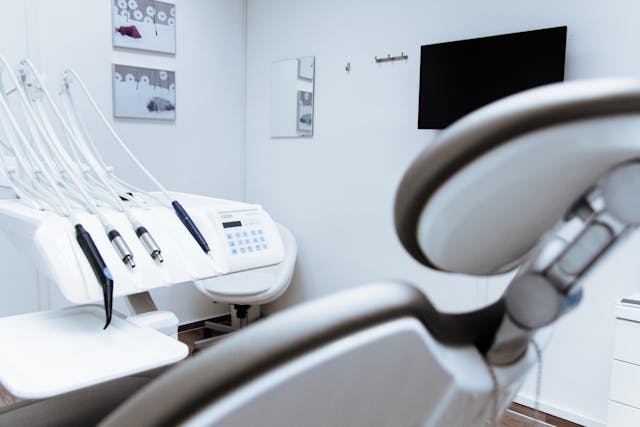Studying Dentistry is much more than learning to take care of teeth. This career combines science, technical skills, a vocation for service, and a high level of academic rigor. If you’re considering becoming a dentist, it’s essential that you understand the requirements, challenges, advantages, and opportunities this profession offers. In this article, we explain what you need to know to study Dentistry, from the prerequisites and curriculum to the job market, challenges, and skills you need to develop to succeed in this exciting healthcare career.
What do I need to know to study dentistry?
To study dentistry, it is necessary to have a solid understanding of basic sciences such as biology, chemistry, and physics. In addition, it is important to have manual skills and dexterity to perform delicate procedures in the patient’s mouth.
Here is a list of useful skills and knowledge for studying dentistry:
- Knowledge of biology, chemistry, and physics.
- Manual dexterity and skill for performing fine procedures.
- Communication skills and empathy with patients.
- Attention to detail and observation skills.
- Problem-solving skills and quick decision-making.
- Leadership skills to manage a work team.
- Knowledge of financial management and dental practice administration.
- Negotiation skills with suppliers and insurance companies.
- Marketing skills to promote a dental practice.
- Knowledge of professional ethics and a code of conduct.
- Teamwork skills and collaboration with other dentists and specialists.
- Ability to manage stress and difficult situations.
- Knowledge of anatomy, physiology, and oral pathology.
- Skills to educate patients on the prevention of dental diseases.
- Knowledge of the latest dental technologies and procedures.
- Ability to adapt to changes in the profession.
Additionally, it is important to note that dentistry is a demanding profession that requires significant study and practice. Therefore, it is essential to be willing to dedicate time and effort to become a competent and successful dentist.

30 Things About Studying Dentistry
1. Educational and Professional Demands
- Dentistry is a highly demanding and rigorous profession.
- It requires a significant amount of study and practice to become a competent dentist.
- Dentistry is an applied science that requires knowledge in areas such as anatomy, physiology, and pathology.
- Manual dexterity is essential for a dentist.
- Communication skills and empathy with patients are crucial.
- Attention to detail is fundamental in dentistry.
- A dentist must have the ability to concentrate and stay alert for long periods.
- Dentistry can be very rewarding when seeing patient improvement, but it can also be frustrating and challenging.
2. Leadership, Management, and Business Skills
- Leadership skills are important to manage a work team.
- Financial management is important in running a dental practice.
- Dentists must stay updated with the latest technologies and dental procedures.
- Dentists should take into account the desires and needs of their patients and adapt to their preferences.
- Dentistry can be a solitary profession, and it is important to find a community of colleagues for mutual support.
- Problem-solving and quick decision-making abilities are vital.
- Dentists must be prepared to work under stress and pressure.
- Negotiation skills are important for dealing with suppliers and insurance companies.
3. Career and Financial Considerations
- Dentistry can be a highly profitable career, but it can also be costly in terms of investment and maintaining equipment and technology.
- Communication skills are necessary to explain dental procedures and treatments to patients.
- Time management is essential to handle a busy schedule and ensure patients receive proper care.
- Personal hygiene is important to prevent the transmission of diseases in dentistry.
4. Collaboration and Teamwork
- Teamwork skills and collaboration with other dentists and specialists are essential.
- Dentists must be able to resolve conflicts and handle difficult situations.
- Dentistry can be a very stressful career, and it is important to find healthy ways to manage stress.
- Dentists may need to work irregular hours, including nights and weekends.
5. Marketing, Ethics, and Patient Relations
- Marketing skills are essential to promote a dental practice and attract patients.
- Ethics are fundamental in dentistry, and dentists must follow a professional code of conduct.
- Dentists should be able to manage patient anxiety and fear during dental procedures.
- Educating patients about the prevention of dental diseases is important.
6. Continuous Learning and Adaptability
- Dentists must be willing to learn and adapt to changes in the profession.
7. Technical and Manual Expertise
- Dentistry can be highly technical and requires fine manual skills.
Why Study Dentistry?
There are many reasons why someone might consider studying dentistry. Here are some of the most common reasons:
- Helping people: Dentistry is a profession that allows dentists to directly help people improve their health and well-being. Dentists have the opportunity to relieve pain and solve dental problems to enhance the quality of life for their patients.
- Job stability: Dentistry is a profession that offers job and financial stability. Dentists are in high demand and receive good compensation, meaning they can expect a steady and secure income.
- Growth opportunities: Dentistry offers many opportunities for growth and professional development. Dentists can specialize in different areas of dentistry and continue learning new techniques and technologies throughout their career.
- Flexibility: Dentistry also offers flexibility in terms of working hours and location. Many dentists have the ability to set up their own practices and create their own work schedules.
- Contributing to societal well-being: Dentists can contribute to the well-being of society by educating people about the importance of dental hygiene and preventing dental diseases.
In summary, dentistry is a rewarding profession that allows dentists to help people improve their oral health and, by extension, their overall well-being. It also offers job stability, growth opportunities, flexibility, and the chance to contribute to society’s well-being.
Disadvantages of Studying Dentistry
While dentistry is a rewarding and valuable profession, there are some disadvantages to consider. Some of these disadvantages are:
- Cost of education: Dental education can be expensive, requiring a significant investment in tuition, books, and necessary equipment for dental practice.
- Long duration of education: Becoming a dentist requires a significant amount of time and dedication. It takes a minimum of 8 years of education, which can be a challenge for those looking to enter the workforce quickly.
- Workplace risks: Dentists are exposed to workplace risks, such as wrist injuries, back pain, and exposure to infectious diseases.
- Stress: Dentistry can be a stressful profession due to the responsibility of providing high-quality medical care and handling difficult patient situations.
- Legal responsibility: Dentists bear significant legal responsibility regarding the care and treatment of their patients. This can be overwhelming and have severe consequences in the case of medical errors.
In summary, dentistry is a valuable profession, but it has its disadvantages, including the cost of education, long educational duration, workplace risks, stress, and legal responsibility. It’s important to consider these disadvantages when deciding if dentistry is the right profession for you.
Challenges of Studying Dentistry
Studying dentistry can present some challenges that are important to consider before deciding to pursue this career. Here are some of the main challenges of studying dentistry:
- Academic difficulty: Dentistry is an academically demanding career, requiring a high level of knowledge in biology, chemistry, and physics, among other subjects. The curriculum includes a large amount of technical and specialized information that can be difficult to learn and understand.
- Time demands: Dental education requires significant time and effort. Students must be willing to dedicate many hours to study and practice in order to succeed in the career.
- Clinical practice: Clinical practice is a fundamental part of dental education. Students must be able to handle stressful situations and work with patients who may be fearful or anxious about dental visits.
- Staying updated: Dentistry is a constantly evolving field, so dentists must stay updated with the latest techniques and technologies to provide the best care for their patients. This may require attending periodic refresher courses.
- Handling difficult situations: Dentists must be capable of handling difficult situations, such as patients who are afraid of dental work or who have mental or physical health issues that affect their dental treatment.
In summary, studying dentistry can present several challenges, such as academic difficulty, time demands, clinical practice, staying updated, and handling difficult situations. It’s important to be prepared to face these challenges when considering this career.
Dental Study Plan Example
Here is a general example of a dental study plan, which may vary according to the university or country:
First Year:
- General anatomy and head and neck anatomy
- Biochemistry
- Cellular and molecular biology
- Physiology
- History of dentistry
- Psychology and ethics
Second Year:
- Dental anatomy and occlusion
- Pharmacology and dental therapeutics
- General pathophysiology
- Microbiology and oral pathology
- Dental radiology
Third Year:
- Diagnosis in dentistry
- Endodontics
- Dental materials and prosthetics
- Preventive and community dentistry
- Periodontics
Fourth Year:
- Surgery and implantology
- Integrated clinic I
- Pediatric dentistry
- Orthodontics and maxillofacial orthopedics
- Oral pathology
Fifth Year:
- Integrated clinic II
- Gerodontology
- Legal and forensic dentistry
- Aesthetic and restorative dentistry
- Public health and epidemiology
Sixth Year:
- Rotational internship
Note that this is just an example of a general study plan, and each university may have its own plan with variations in content, duration of subjects, and inclusion of professional practice at different stages of the program.
Dental Career Opportunities
Dentistry is a highly demanded profession that offers a wide range of career opportunities in different areas. Here are some areas where dentists can practice:
- Private dental offices: Many dentists work in their own offices, providing dental care to patients of all ages.
- Public health institutions: Dentists can work in public clinics and hospitals, caring for patients who do not have access to private dental care.
- Educational institutions: Some dentists work in educational institutions, teaching dentistry and supervising students.
- Research and development: Dentists can also work in research and development, investigating new techniques and technologies in dentistry and developing new products and equipment for dental care.
- Dental industry: Dentists can work in dental industry companies, such as manufacturers of dental products or dental insurance companies.
- Forensic dentistry: Dentists can work in forensic dentistry, helping identify individuals through their dental structure in legal and forensic cases.
- Sports dentistry: Dentists can work with athletes, providing specific dental care for sports and sports-related injuries.
In summary, dentists can practice their profession in different areas, including private dental offices, public health institutions, educational institutions, research and development, the dental industry, forensic dentistry, and sports dentistry. This provides a wide range of career options for dental graduates.
Dental Activities and Functions
A dentist is an oral health professional responsible for diagnosing, preventing, and treating diseases and conditions affecting the teeth, gums, tongue, palate, and other parts of the mouth and face. Here are some of the activities and functions that a dentist may perform daily:
- Oral exams: Dentists conduct regular oral exams to detect dental problems such as cavities, periodontal disease, oral cancer, and more.
- Dental cleaning: Dentists perform dental cleanings, removing plaque and tartar buildup on teeth to prevent cavities and gum disease.
- Cavity treatment: Dentists fill cavities and restore damaged teeth using modern techniques and materials.
- Tooth extractions: Dentists remove damaged or infected teeth that cannot be saved by other treatments.
- Endodontics: Dentists perform root canal treatments to save infected or inflamed teeth.
- Periodontal disease treatment: Dentists treat periodontal diseases like gingivitis and periodontitis, which can damage gums and bone structures supporting the teeth.
- Orthodontics: Dentists correct misalignment of teeth and bite problems using braces and other orthodontic devices.
- Dental implants: Dentists place dental implants to replace missing or damaged teeth.
- Emergency care: Dentists also provide emergency care for severe tooth pain, oral injuries, and other urgent issues.
In summary, dentists play a critical role in maintaining the oral and overall health of their patients. From routine oral exams to complex treatments, dentists perform a variety of activities and functions to maintain their patients’ health and well-being.
Interesting Facts about Dentistry
- Dentistry has existed for thousands of years: Ancient Egyptians, Greeks, and Romans used rudimentary dental techniques to treat dental problems.
- Tooth decay is one of the most common diseases in the world: It’s estimated that over 90% of the global population has had tooth decay at some point in their lives.
- Dentists can detect certain diseases: By examining the mouth and teeth, dentists can detect early signs of certain diseases like diabetes, cancer, and heart disease.
- Mammal teeth can reveal their age: Like tree rings, mammal teeth have growth rings that can reveal the age of the animal.
- Shark teeth are different from human teeth: Shark teeth are not attached to the gums but are embedded in their jaw.
- Dentists can treat snoring and sleep apnea: Dentists can create devices that help open airways and reduce snoring and sleep apnea symptoms.
- Dentists can also treat temporomandibular disorders (TMD): TMD affects the jaw joint, and dentists can provide treatments to relieve symptoms such as jaw pain and headaches.
These are just a few of the interesting facts about dentistry. It’s a fascinating field, and there is always more to discover and learn.
Things You’ll Experience During a Dentistry Career
Here are a few things that dental students may experience during their career:
1. Rigorous Study
Dentistry is a demanding and rigorous profession that requires a lot of time and effort. Students should expect to spend many hours studying and attending classes and labs.
2. Clinical Practice
In the later years of their studies, dental students begin working with real patients. This can be both exciting and challenging as students apply theoretical knowledge to real-life situations.
3. Handling Patients with Anxiety
Dental students will encounter patients who are afraid or anxious about dental procedures. Learning how to handle these situations professionally and reassuringly is a key skill.
4. Ergonomic Challenges
Dentists and dental students often work in uncomfortable positions and perform repetitive movements, which can lead to long-term health issues such as back pain and posture problems.
5. Financial Investments
Dental education can be expensive, requiring significant financial investment in equipment and materials. Many students will also need to take out loans to cover their education costs.
6. Continuous Learning
Dentists and dental students must stay current with advancements in the field. Ongoing education and training are essential for success in this ever-evolving profession.
7. Balancing Personal and Professional Life
The demanding nature of dentistry can make it difficult for students to balance their personal lives with the workload of academic studies and clinical practice.
These are some things that dental students may experience during their careers. However, with dedication, perseverance, and a passion for dentistry, students can overcome these challenges and become excellent oral health professionals.
If you’re considering studying Dentistry but you’re still not completely sure whether it’s the right career for you, we invite you to read our blog on vocational guidance. There, you’ll find tools and advice that will help you understand yourself better, identify your interests, and make an informed decision about your professional future.


